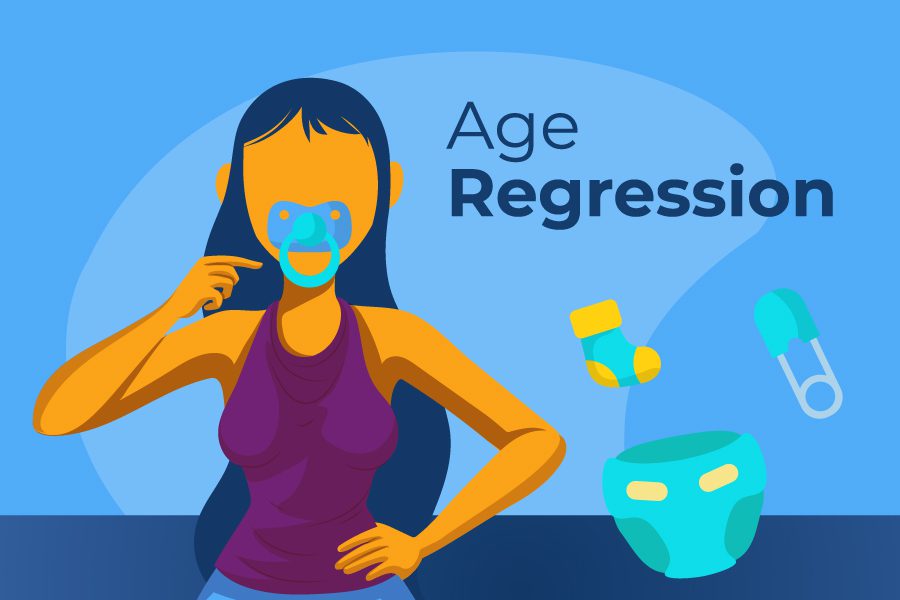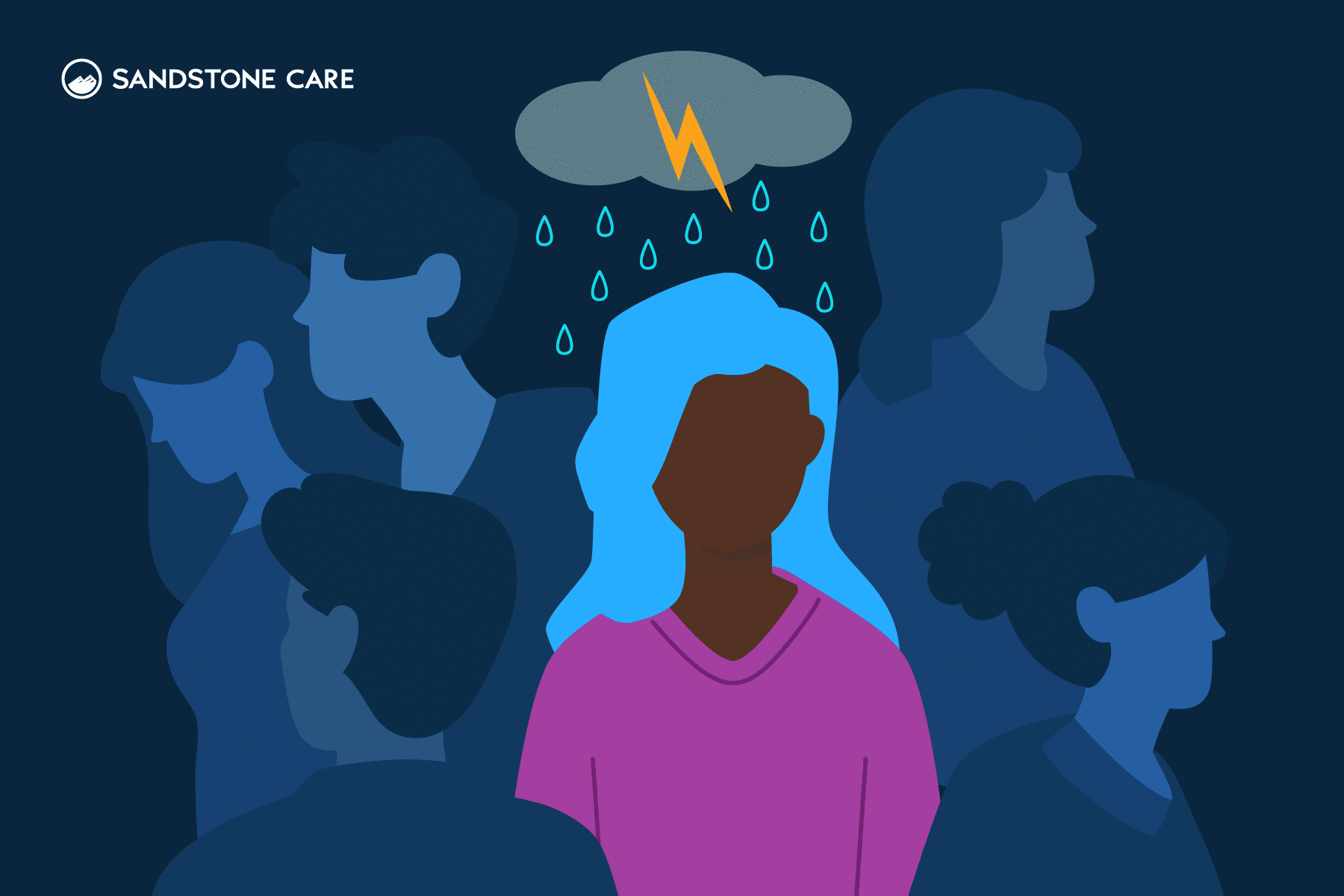Age Regression Disorder
What Is Age Regression?
Age regression is when someone reverts to behaviors, thought patterns, or emotions that are associated with a younger age than they physically are.
When people experience traumatic events or mental health conditions, they can become overwhelmed and unable to function in their daily lives. One coping mechanism is to begin acting or thinking in a way that reflects their life at a younger age.
Age regression is most popularly known as something that happens to children and teenagers, but it can occur at any age.
It can also look very different from person to person since it drives several kinds of behavioral, mental, and emotional symptoms.
While age regression might not be harmful by itself, it can often be a sign of a much deeper issue going on that needs to be addressed.
Since recovering from age regression requires an expert understanding of developmental stages, it is important to work with a licensed therapist who can help to get to the root of the issue.
At Sandstone Care, we recognize that struggling with a mental health disorder of any kind can be an isolating and debilitating experience. If you or someone you know are struggling with a mental health disorder, there is treatment available. At our facility, we are here to support you.
What Are the Different Types of Age Regression?
Some of the different types of age regression include involuntary age regression, voluntary age regression, reactive age regression, spontaneous age regression, and chronic age regression.
Involuntary age regression occurs when a person regresses to a younger state unintentionally. They often do not even realize they’re doing it.
This type of behavior may include falling into childlike habits, including their ways of talking and expressing their emotion. For some children, it may include behaviors they have already outgrown, such as bedwetting, curling into the fetal position, or temper tantrums.
It may also include certain self-soothing techniques like thumb sucking, wanting to use a pacifier, or needing a certain stuffed animal to fall asleep.
While age regressions can feel frustrating for caregivers, it is important to remember that children often do not regress to try and be disobedient. Instead, it is an unconscious response to mental and emotional stress.
Voluntary age regression can include many of the same behaviors as involuntary age regression, but this time, the person is aware that they are engaging in regressive behavior to find comfort or relief from negative emotions.
Someone who has reactive age regression will typically turn to regressive behaviors as a response to stressful situations. For example, a grieving teen might start throwing tantrums after experiencing the sudden loss of someone they love.
On the other hand, someone with spontaneous age regression may take part in regressive behavior with no apparent trigger at all. This could last for minutes, hours, or continue on for days.
Someone with chronic age regression will typically stay in a regressive state for much longer periods. They may even feel afraid about going back to an adult state because it will require them to face certain uncomfortable or traumatic emotions.
How Long Does an Age Regression Episode Last?
The length of an age regression episode completely depends on the person’s unique situation and the type of age regression that they have.
Some people may experience only very brief episodes lasting for minutes or hours. Other people may experience age regression on a more long-term basis, lasting for days or even weeks at a time.
The length of an age regression episode is also tied to the type of interventions that are used to help them recover from it. For example, a child who is struggling with age regression will recover faster with help from patient caregivers and mental health professionals than a child who is punished or simply told to “grow up.”
Is Age Regression Bad?
Age regression is not always bad by itself. However, when it is used as a coping mechanism for a deeper issue that is not being addressed and affects a person’s daily functioning, it can become a problem.
What Is an Example of Regression in Adults?
Some examples of age regression in adults may include using baby talk, cuddling with stuffed animals, or taking part in certain child-like activities they used to enjoy when they were younger.
Voluntary Age Regression
What Is Voluntary Age Regression?
Voluntary age regression is when someone reverts to younger behaviors on purpose, usually as a coping mechanism for trauma or response to stress.
Can You Consciously Age Regress?
Yes, people with a condition called voluntary age regression are consciously choosing to take part in younger behaviors and can stop any time.
Is Voluntary Age Regression Okay?
Whether or not voluntary age regression would be considered “okay” by a mental health professional depends on why they’re doing this and whether or not it is affecting their daily functioning in life.
Some people with voluntary age regression may be struggling with an undiagnosed mental health problem that should be addressed.
This could be borderline personality disorder (BPD), dissociative identity disorder, post-traumatic stress disorder (PTSD), or other types of mental illness.
While taking part in voluntary age regression may help them feel better for a little while, it may not allow them to heal from the root cause of the issue.
How Do You Stop Voluntary Age Regression?
You can stop voluntary age regression by working with a healthcare provider, going to therapy, and learning healthy coping strategies for stress.
Involuntary Age Regression
What Is Involuntary Age Regression?
Involuntary age regression is when someone begins acting with a younger state of mind as part of an unconscious defense mechanism.
Common triggers include feeling overwhelmed or burned out, arguments and confrontations, reminders of past trauma, or feelings of abandonment.
The regression serves as a coping mechanism, offering a sense of safety or protection during emotionally charged situations.
However, because it is not consciously controlled, the person may not be aware of how or why it’s happening.
What Does Involuntary Age Regression Look Like?
Someone with involuntary age regression will unconsciously revert back to behaviors or coping mechanisms that don’t fit with their age.
Typically, these episodes will happen when the person is feeling sad, stressed, anxious, or overwhelmed.
They may speak in a different tone of voice, engage in behaviors that may seem childlike, or seem to struggle to cope with their emotions in an effective way.
How to Stop Involuntary Age Regression?
Working with someone who specializes in psychiatry or psychotherapy is one of the most effective ways to stop involuntary age regression.
While self-help techniques can help someone cope with age regression, it does not go away until the root cause is taken care of.
Working with a mental health professional like this can also be a good way to get diagnosed with a potential underlying mental health disorder and begin receiving treatment.
It can also help you to become more aware of your regressive behaviors and identify the history, triggers, and causes of why you may behave this way.

Is this blog hitting close to home?
We’re here to help.
Age Regression Causes
Age regression can be caused by many different things, including traumatic events, stress, and untreated mental health disorders.
What Causes Age Regression?
Some causes of age regression include:
- Past trauma or PTSD
When someone has been through trauma, especially in childhood, they may regress if something reminds them of that experience. - High stress or anxiety
Feeling overwhelmed can cause the brain to go back to earlier ways of coping, like acting younger or needing comfort. - Mental health conditions
Disorders like borderline personality disorder (BPD), dissociative identity disorder (DID), depression, and schizophrenia can include age regression as a symptom. - Attachment issues
People who struggle with trust or fear being left may regress during emotional situations or conflicts in relationships. - Autism or developmental delays
Some people with autism or other developmental challenges may regress when they feel confused, overstimulated, or upset. - Substance use or withdrawal
Using certain drugs, or stopping them suddenly, can affect how a person copes and lead to childlike behavior. - Dementia or memory loss
In older adults, age regression can happen as memory and thinking skills decline, causing them to act like a younger version of themselves.
What Triggers Age Regression?
Life stressors, trauma, conflict, and undiagnosed mental health disorders can all play a role in triggering age regression.
Is Age Regression a Form of Dissociation?
Yes, for some people, age regression can be a form of dissociation.
In other words, people may use it as a way to disconnect from their identity, their life circumstances, or their thoughts and emotions. Sometimes this can cause symptoms like false memories.
Why Do I Mentally Feel Like a Child?
It is possible that you mentally feel like a child due to a variety of different mental, emotional, or developmental reasons.
It is possible that you have unresolved trauma and take on a younger headspace as a way of coping with it. You may also feel like a child due to not having your needs met fully during childhood and not having enough nurturing, security, or safety.
It is also possible that you’re feeling this way as a result of a mental health disorder that has not been diagnosed or treated. This could include dissociative disorder or PTSD.
Finally, it is also possible that you are experiencing this because you are nostalgic for the simplicity of childhood. This can be a common experience when adults idolize the carefree days of their childhood.
You may also feel yourself wishing you could go back to that time when you had less stress or responsibilities.
Age Regression Symptoms & Signs
How Do You Tell if You Age Regress?
Age regression can look different from person to person but may include finding comfort in childlike activities, using childlike speech patterns, and often reverting to a younger mindset when you’re feeling stressed or sad.
What Are the Signs of Age Regression in Adults?
Age regression in adults can involve struggling to deal with negative emotions, using child-like self-soothing methods, and dissociating from reality as a coping mechanism.
What Is an Example of Regression in Adults?
One example of regression in adults could be crying or melting down during a conflict at work instead of handling it professionally.
How Long Does Age Regression Usually Last?
Age regression lasts different amounts of time for different people.
This also depends upon what type of age regression the individual may be experiencing. For example, someone with spontaneous age regression could have an episode that lasts anywhere from a few minutes to a few hours.
However, for some with chronic age regression, the episode will likely continue for much longer. This could be anywhere from days to weeks at a time.
Diagnosing Age Regression
How Is Age Regression Diagnosed?
Age regression is most often a symptom of an underlying mental health condition. A medical professional will help to diagnose that mental health problem by looking at their regressive behavior and trying to determine what is causing it.
In order words, it wouldn’t “age regression” wouldn’t necessarily be the condition that the doctor is diagnosing, but rather a symptom of another condition.
They would look at things like the person’s behavior when they are experiencing a regressive episode. They would also look at potential triggers that can lead to an episode.
For example, they may find that traumatic flashbacks tend to cause an individual to experience an age regression episode. From there, they can look at what type of trauma in the person’s past that might be causing this.
They may find that post-traumatic stress disorder (PTSD) is the mental health condition causing these episodes and diagnose them with this disorder.
How Do I Know if I Age Regress?
If you typically find yourself reverting to emotional, behavioral, or mental patterns that are associated with a younger period in your life, you may experience age regression.
You may notice that you are most likely to experience age regression when you’re experiencing negative emotions that could be overwhelming to you.
Can You Get Stuck in Age Regression?
Yes, people can become stuck in an episode of age regression for extended periods of time, especially if the underlying mental health issue causing this has not been addressed.
Age Regression Treatment
Can Age Regression Be Treated?
Yes, age regression can be treated with the help of a mental health professional by identifying and addressing the root cause of the issue.
This root cause is most often tied to unresolved trauma or some sort of untreated mental health issue.
In order to treat age regression for someone who is coping with childhood trauma, for example, a therapist may use cognitive behavioral therapy to help them practice viewing their shame about the event as something separate from their self-worth.
How Can I Help Someone Who Age Regresses?
You can help someone who experiences age regression by making them aware that this is a type of behavior that they’re engaging in.
Since many people experience this condition unconsciously, they may not be aware that this is something they may do to cope with different emotions they may be experiencing. Once you have made them aware of this, encourage them to seek mental health treatment.
The reasons that a person may experience age regression can be complex and difficult to understand. If this isn’t something that you struggle with yourself, this person’s behavior may seem very strange to you. However, it is very important to show them support and compassion.
Making fun of this person’s behavior or being judgmental about it can be extremely detrimental to them. It can help to increase the negative stigma surrounding mental health and may persuade them against choosing to get help.
What Is Age Regression Therapy?
Age regression therapy involves a therapist guiding someone to go back to an earlier stage in their life to help them identify trauma or past events that may be affecting their current mental health.
This can help to understand why someone may struggle with certain emotional triggers or mental health problems. It can also help them to heal from past pain, resolve trauma, and improve their mental health.


Let’s Take the Next Steps Together
A porn addiction is when a person cannot stop porn use, despite the negative consequences it has on their life and wellness. Sandstone Care is here to support teens and young adults with mental health and substance use disorders.





